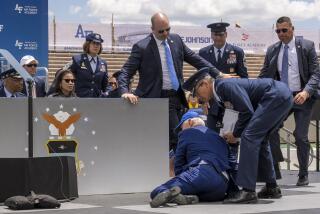Gorbachev Expected to Seek Younger Leaders : Older Politburo Members May Be Replaced in Party Chief’s Campaign to Rejuvenate Nation
- Share via
MOSCOW — New Soviet leader Mikhail S. Gorbachev’s apparent goal to rejuvenate Soviet society will require major changes in the Politburo, the all-powerful gerontocracy of the Soviet Union.
Since his swift takeover of power from the late Konstantin U. Chernenko as general secretary of the Soviet Communist Party, there have been reports that the 54-year-old Gorbachev will attempt to transform the Politburo into a reflection of his own youthful image. He is the group’s youngest member.
Five of the 10 current members of the body are more than 70 years old, and several owe their eminence entirely to the late President Leonid I. Brezhnev, who died in 1982 at the age of 75.
Gorbachev is likely to press for expansion of the membership of the Politburo, which was reduced to its lowest number in 30 years by the deaths of Chernenko last March and Defense Minister Dmitri F. Ustinov in December.
If the size of the Politburo is increased, representatives of the KGB secret police and the military may be added. If a KGB man is chosen, it will likely be the director, Victor M. Chebrikov, 61, who is now a candidate, or non-voting, member.
No Military Member
Since Ustinov’s death, there has been no military man on the Politburo, and Gorbachev may seek to remedy that and solidify his ties with the armed forces.
The Politburo, traditionally shrouded in secrecy, makes all the key decisions in the Soviet system--and has done so since the Bolshevik Revolution of 1917. Its full name is Political Bureau of the Central Committee of the Communist Party of the Soviet Union, but it runs the government as well as the party, through weekly meetings that invariably are held on Thursdays.
Josef Stalin gathered so much power in his own hands that Politburo members became yes-men, with their jobs and even their lives depending on his whim. But normally the body acts as a check on one-man rule, and Kremlin leaders now seek Politburo support before they take any important action. The signs are that consensus decision-making will continue under Gorbachev, but that he will also try to make the body more representative of his generation.
Egor K. Ligachev, a party secretary who has worked with Gorbachev on personnel matters, has been described by a Western diplomat as a strong possibility for advancement to the Politburo. He is 64. Vladimir I. Dolgikh, 60, an engineer and industrial manager who is already a non-voting member, is also considered likely to be promoted.
Western diplomats also speculate that Politburo member Vitaly I. Vorotnikov, the 59-year-old leader of the Russian republic, is a likely successor to Premier Nikolai A. Tikhonov, the Politburo’s oldest member, who will be 80 on May 14.
The Junior Member
Vorotnikov, an industrial specialist who once worked in a machine factory, is said to have been a protege of the late President Yuri V. Andropov. He has worked closely with Gorbachev, and he is the Politburo’s junior member, named only in 1983.
Geydar A. Aliyev, 64, a Politburo member from Azerbaijan, one of the smaller republics, is also regarded as someone to watch in Kremlin politics. He has a reputation as an effective manager and has been ambassador to Third World governments.
Foreign Minister Andrei A. Gromyko, 75, nominated Gorbachev to succeed Chernenko in the top party post, and the two apparently work closely together. Gorbachev is expected to rely on Gromyko for advice on foreign affairs but to eventually develop his own expertise in this area.
Grigory V. Romanov, who is said to have been a rival of Gorbachev for the top job, is now expected to retain his post as supervisor of the arms industry and perhaps act as spokesman for the military in the Politburo if no military man is named to the group. Romanov is 62.
There are several members who are regarded by Western observers as less powerful than their colleagues. Viktor V. Grishin, 70, is head of the Moscow party and was close to Chernenko and other members of the Old Guard. With the rise of Gorbachev, his role may be limited.
Less Powerful Members
Similarly, Mikhail S. Solomentsev, 71, and Dinmukhamed A. Kunayev, 73, are not regarded as heavyweights in the Politburo. Even Vladimir V. Shcherbitsky, the 67-year-old Ukrainian party leader, is seen as a relative outsider; he spends most of his time in Kiev.
According to what in recent decades has come to be tradition, Politburo members are not removed for political reasons. During the three decades of the Stalin era that ended with his death in 1953, dismissal was common, and it was not always nonviolent.
“Before 1953, it was only by way of exception that a Politburo member died a natural death,” Dutch scholar John Lowenhardt has written in a book about the Politburo. He said that Stalin was directly or indirectly responsible for the deaths of 13 of the 16 Politburo members who died while he headed the system.
When an attempt to dump him from power failed in 1957, Nikita S. Khrushchev retaliated by purging his opponents and arranging the appointment of eight new members who were loyal to him. Khrushchev was removed by his colleagues in 1964, but even then it was said that he had “resigned” for health reasons.
More to Read
Sign up for Essential California
The most important California stories and recommendations in your inbox every morning.
You may occasionally receive promotional content from the Los Angeles Times.













